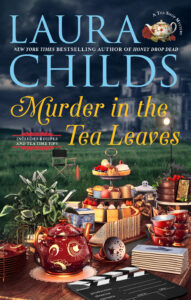If you’ve written a few chapters and are struggling to finish your book, I know exactly how you feel. Writing is tough work. You’re constantly stretching your imagination to spark ideas and put words on the page. The whole process is stressful, tiring, and makes you feel as if you’re burning the candle at both ends. Because you are. But there are a few tricks that can make this process a lot more streamlined – and I’m going to share them with you.
First, it helps to have an outline. Some authors are totally brilliant and don’t bother with this, but I’m a big believer in outlines. They help speed up my thought process and create a roadmap for exactly where my story is going. In Murder in the Tea Leaves, my newest Tea Shop Mystery, I knew I wanted to begin with a film shoot in a spooky old mansion. But that was just a concept, not an actual plot. So I began mapping everything out on a large sheet of paper, starting with a bombshell murder to propel my story forward, then adding in characters, plot points, a second murder, a darkest before dawn scene (where my protagonist, Theodosia, gets frustrated and basically tears out her hair), then a big, crazy ending. Please know (and trust) that much of your novel will evolve organically if you outline carefully. It’s all about crafting a plot versus flying by the seat of your pants and hoping it all turns out like a ready-made best seller.
Now that you’ve got the bones of your book, it’s time to do a bit of research. For every novel I write, I create a concept book. Sometimes it’s a three-ring binder, other times it’s a folder that contains articles, pictures, clippings, and even words that catch my fancy. For example, let’s say your novel deals with crime scene investigation – so you’d find articles on DNA testing, evidence collection, lab work, etc. – anything to help you be spot on. When I wrote my first thriller, Little Girl Gone, which was set in the Twin Cities, I visited all the locales I referenced in the book and took photos. It helped me write more accurate descriptions and create a genuine sense of place for my readers. However, a key point to remember is that most authors adore doing research. But research only gives you the illusion of writing, it isn’t actual bang-it-out writing. You can easily help streamline your workdays by doing most of your research up front.
Okay, another tip once you start writing – don’t stop and compulsively edit your manuscript. Try to write straight through until you have a complete chapter. If you don’t have the exact words or description, type in a few x’s and keep going. If you need to look something up, don’t. Simply x it again. Once you finish a chapter, then you can go back and look at it. It’s probably not too bad, right? Sure, it might need a little punching up, but what doesn’t? When I wrote Eggs in Purgatory, my first Cackleberry Club Mystery about a cozy country cafe, I wrote the book straight through in three-month’s time without stopping to make a single change or edit. Only when I was one hundred percent finished, did I go back and make my edits and corrections. Much to my surprise, that book got a huge mention in Publisher’s Weekly and the second book in that series, Eggs Benedict Arnold, went on to hit the New York Times bestseller list.
Okay, about your writing days – you must keep them absolutely sacrosanct. That means no going out for lunch, shopping online, checking social media, etc. You’re only allowed to walk your dog once and take fifteen minutes for lunch. (You did say you wanted to write faster, didn’t you?)
There’s another tip I can’t emphasize enough – and that’s to read as much as you can. After a while you’ll start picking up techniques that other authors use. You’ll see how John Sandford keeps his writing conversational so it’s easily digestible for readers. And when Stephen King makes a leap in credibility? Well, his writing is just so cajoling and comfortable that he actually makes you believe in vampires and doomsday scenarios. Once you hone your own personal writing style you’ll be able to write faster and smarter.
There’s also nothing like first-hand experience to jumpstart a novel and keep it clicking along. Several years ago, my husband scored an invitation to visit friends in New Orleans during Mardi Gras. All at once we had access to float dens, partied with float builders, marched in one of the Mardi Gras parades (in costume, of course!), and attended the black tie Rex Ball. Suddenly, I had inside information about something I’d never even thought about. Did I put this know-how to work? Sure did. In four months-time I was able to write Keepsake Crimes, my first Scrapbooking Mystery set in New Orleans, and then write fifteen more books in that series.
I’ve also been able to use my general know-how in pretty much all of my novels. I’ve included art and antiques (thanks to Dr. Bob, my clever art historian husband) in my Tea Shop Mysteries, and have also drawn upon my knowledge of horses, investing, marketing, stamp collecting, dog training, tea, baking, and lots more. I have every confidence that you are also a unique repository of all sorts of skills, talent, and know-how. So put your knowledge in your book and jump your writing days into hyper speed.
This is also super important. When I first started writing mysteries, I’d read a novel for fun, then I’d go back, read it a second time, and rip it apart. I figured out exactly why the book’s opening chapter grabbed me and how the first turning point propelled unwilling protagonists to get involved. I also analyzed how the author created a “darkest before dawn” scenario, then went on to engineer a surprise ending. Don’t be afraid to learn (and borrow) writing techniques from the masters. The more you see how others write, the faster you’ll gain confidence and speed.
A couple more tips: Be sure you have a clear idea of why you’re writing your book. Are you sure there’s a viable market for your subject matter? Who’s your audience? What writer’s tips and tricks are you going to employ to make readers care deeply about your subject matter? Remember, there’s nothing worse than having to go back and retool your manuscript – it’s a terrible waste of time!
And always (always!) be daring! Go ahead and tackle new subjects, introduce oddball characters, or do plot loops. There are wonderful authors who’ve created entire new worlds (Ray Bradbury), mind-blowing situations (Michael Connelly), and amazing plot twists (Gillian Flynn). They made it work and so can you!
Love to you and good luck with your writing!
*


















